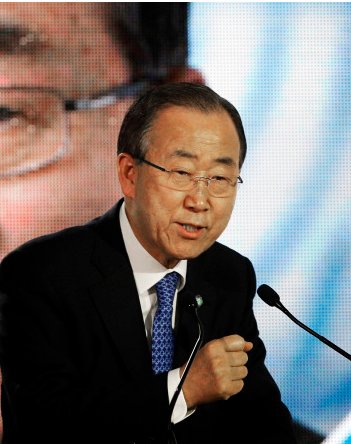With the imminent launch of a new centrist political party by Ahn Cheol-soo, the leading parties are accelerating their search for a game changer: a well-known and respected public figure who can unite their flock and engage swing voters; somebody like United Nations Secretary-General Ban Ki-moon.
So far, the ruling Saenuri Party appears to have the upper hand over the main opposition, the Minjoo Party of Korea.
Ban, in a telephone conversation with President Park Geun-hye on New Year’s Day, commented that “history would highly value her vision and courageous decision,” referring to the government’s latest deal with Japan on the wartime sex slaves.
As a top U.N. official who has supported the “closure” of the 24-year-long dispute that has often triggered diplomatic tension between Korea and Japan, his remarks are significant.
 |
U.N. Secretary-General Ban Ki-moon delivers a speech during the United Nations Climate Change Conference in Le Bourget, France, on Dec. 10. AFP-Yonhap |
But the domestic public also started viewing him differently ― with his current term set to end in December this year, his remarks were seen to be political.
If he does decide to join the presidential race after his U.N. tenure, it is expected to raise the chances of the party he affiliates himself with. Unlike Ahn, who is without a specific regional foothold, Ban is a living hero in his home turf of Chungcheong Province, which usually holds sway votes in elections.
In the New Year’s public survey conducted by local pollsters Media Research, Research & Research and Korea Research, Ban stood at 27.4 percent, 23.3 percent and 23.8 percent, respectively, in approval ratings among potential presidential candidates.
The corresponding figures for ruling party leader Rep. Kim Moo-sung and the opposition party head Rep. Moon Jae-in, as well as independent lawmaker Rep. Ahn Cheol-soo, all remained in the 10 percent range.
Despite the overwhelming competition, Kim rolled out the red carpet for the former diplomat.
“Ban would make an excellent (presidential) candidate and I may even reach out to scout him after the general elections,” Kim said in an interview with the Chosun Ilbo.
Ban, however, has different views with the ruling camp on a number of key issues, especially in inter-Korean relations.
“Communication is the one and only tool to solve the Korean peninsula’s problems,” he said last May upon announcing his thwarted plan to visit Gaeseong Industrial Complex.
His tone was clearly more temperate than that of President Park Geun-hye, who pledged to “deal sternly with North Korea’s provocations.”
The Minjoo Party, on the other hand, was taken aback by what seemed to be a sign of Ban befriending Saenuri.
Pyo Chang-won, a celebrated forensic psychologist who recently joined the party, claimed Ban was able to rise to his current status partly due to the Korea-Japan historical disputes. He also pointed out that it was the sincere election campaign run by the liberal government of Roh Moo-hyun that helped him.
Minjoo Party leader Moon was gentler.
“Ban has his roots in our party and we firmly believe that he will stand with us once his current term in the U.N. ends,” he said.
Amid the tug-of-war between domestic parties, Ban has so far remained reticent over his political plans.
Last year, Ban received good press over his role in the international forum, especially over the Paris agreement on climate change. As the U.N.’s chief official, he was praised for having pulled the right strings on the U.S. and China to elicit their active participation in the deal.
His key goal during this last year in office is to make his presence in the inter-Korean relations and realize his unattained visit to North Korea.
If he is to enter the presidential race in 2017 and win, Ban will become the second among former U.N. secretary-generals to become a state leader.
Kofi Annan, who held two consecutive terms from 1997-2006, was suggested as a powerful candidate to Ghana’s next presidency, but largely remained in the nongovernmental field.
Kurt Josef Waldheim, secretary-general from 1972-1981, was elected Austrian president in 1985, but he faced international controversy over his earlier wartime service as an intelligence officer.
By Bae Hyun-jung (
tellme@heraldcorp.com)








